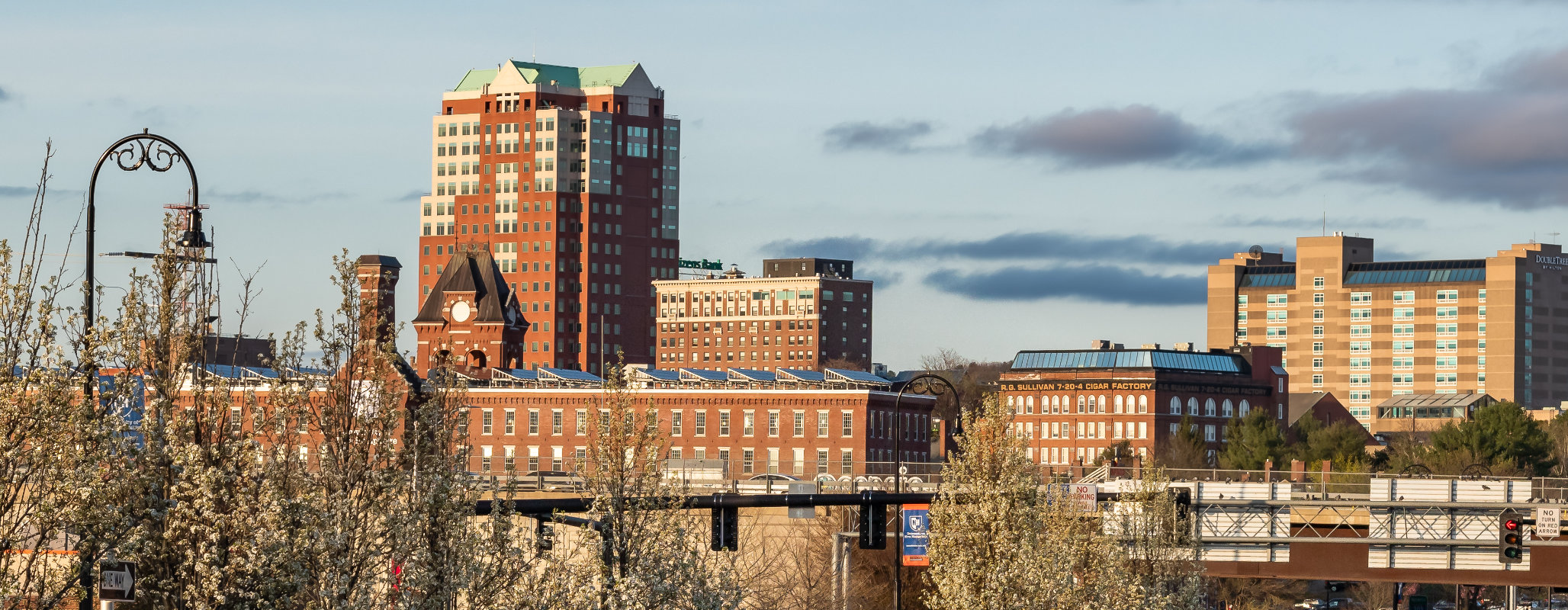Holly HillhousePrimary Election 2022 Winner

Running forState Representative - Hillsborough 16 (Ward 6)
in 2022
Running as Democrat
My name is Holly Hillhouse and I am a social worker in community mental health who is running for State Rep for Manchester Ward 6. I moved to New Hampshire in 2016 to work in the mental health system. Since then, I have worked in four separate community mental health regions – including Greater Manchester – which has given me a diverse background and knowledge about how social services are functioning across southern New Hampshire. Doing community-based work, I have seen firsthand the struggles of people in Manchester and in the Granite State. In early 2022, I learned that the first generation of Hillhouse’s to come to North America from Ireland came to Nutfield, NH to live – something I did not know upon moving here from south Georgia. I haven’t been here long, but my ancestral roots run deep here, and New Hampshire has become home. New Hampshire allowed me to flourish in my career and personal life; I feel I owe it to my community to serve them to the best of my ability.
I am a first-time candidate running for office. I did, however, work with Fair Fight Action last
summer in Washington, D.C. to talk to lawmakers about the importance of voting rights protections and
accessibility across the voting process. I was able to meet and work with Heath Howard – another
candidate running in Strafford – during our time in D.C. to advocate for New Hampshire voters
Current jobI am an Outreach Therapist for Seacoast Mental Health Center
In the past I have done a variety of social service roles, primarily case management and functional
support services, for the Mental Health Center of Greater Manchester, Greater Nashua Mental Health
Center, and the Center for Life Management. I also provided these services at a community mental
health center in Georgia – Pineland Behavioral Health & Developmental Disabilities. I interned on
Greater Nashua’s ACT team for my first practicum of grad school in 2018, and from 2020-2021 I interned
with the national Crisis Text Line providing text-based crisis interventions using AI software to field crisis
conversations.
Current residenceManchester, NH
Time lived in NHIt will be 6 years exactly on August 20th, 2022.
HometownSpokane Valley, Washington. I have also lived in Jacksonville, Arkansas and Statesboro, Georgia. My father works in aerospace so jobs are often few and far between. But living in all of these places allowed me to meet so many different people and make connections far and wide!
Bachelor of Science, Justice Studies, Minor in Psychology
Georgia Southern University 2014, post-bacc 2015
Master of Social Work, concentration in Service to Hispanic Children & Families
Our Lady of the Lake University 2021
Best way to contact candidateThe best way to reach out with campaign questions is to send us a message on Facebook
(Hillhouse4NH) or to email me at holly.hillhouse@comcast.net
If elected or re-elected, please describe legislation you expect to sponsor or co-sponsor.
The primary types of legislation that I am interested in sponsoring or co-sponsoring of course
depend on what committees I would be a part of. With that being said, I would like to sponsor
legislation regarding the provision of state benefits so that they are using accurate cost-of-living
and inflation rates in order to calculate eligibility and amount of benefits for people in need. Our formulas should be ever-evolving to match our current financial needs. Additionally, I would like to sponsor legislation to make all election days paid holidays – including local, state, federal elections of all kinds. Nobody should be excluded from democracy because their working hours don’t align with their polling hours, and so many people can’t afford to take the day off to vote.
What are the most important concerns you’ve heard from Manchester residents and how can you address those concerns if elected or re-elected?
From my conversations so far, I definitely think housing, education, and healthcare (including mental health) are top priorities for residents in Manchester. Part of the reason for this is that these issues are so interconnected – especially housing and education. For example, property tax impacts everyone, even those of us who can’t afford to buy a home. Property owners who have renters often cannot maintain the costs of maintaining the property in addition to the property tax, homeowner’s or condo association fees, etc. This leads to housing instability not just for long-time homeowners and new home buyers, but renters as well. I believe there are two solutions that would help to ease the burden these things have had on the city: 1) Using money from the state budget surplus to invest in the education system, alleviate property tax burden, and stimulate the economy, and 2) legalize recreational marijuana and tax it accordingly. Legalizing marijuana will not only bring in considerable revenue for the state to be used towards the education system, but it will alleviate some of the burden on the justice system in prosecuting minor drug crimes involving marijuana. It will also allow mental health providers to work more effectively toward harm reduction with clients who are trying to manage severe mental health barriers.
New Hampshire legislators are citizen legislators and being a legislator is a significant time commitment. How much time per week can you spend on legislative duties while the Senate/House is in session?
I am, like many other candidates and current state reps, a full-time employee. I work five days per week in the mental health system, but even then I still work less than many other people in the state. While I do have time in the evenings and days off, I do also recognize that much of the business conducted in the legislature does happen during 9-5 business hours. This is something I would like to explore and address, however. The median age of a current rep is significantly higher than the median age of New Hampshire citizens. It is important that we are creating opportunities for working residents to participate in their local government. After all, they are the powerful force that keeps New Hampshire running and chooses who is in the legislative body.
How do you feel the current divisive political climate in the United States will impact the New Hampshire General Court over the next two years and how would you navigate that divisiveness in your duties?
This is something I think about constantly. My one-to-one conversations with my clients at work is often a great measure of what a community is feeling, thinking, wanting, needing, etc. So many people that I talk to both inside and outside of work are feeling tired of the polarization. Though I still see so much of it portrayed online, in the media, or within politics, talking to people on a personal level often reveals a much more nuanced response. It is tempting to lean into the divisiveness, and I do firmly believe that there are ethical standards that are non-negotiable (like protecting human rights), but it is also critically important for us to be able to explore conflicting viewpoints for perspective. It is important to consider what someone else has to say. It is also important that we aren’t just making decisions based on blue or red. The decisions we make should be based on remaining authentic to our ethical compass as a community.
What is the most significant issue facing Manchester residents at the municipal level and how can you, as a legislator aid the city government on that issue?
One of the most common municipal concerns I hear from people relates to homelessness. Homelessness is a very complex, multifaceted issue that is hard enough to understand even when you work in social services, so I can see why it is hard to understand in general. The city and the state have tried and are trying many different approaches to ease the countless negative impacts that come along with homelessness. What I think is missing is a more widely- coordinated, evidence-based approach to eliminating homelessness that gets to the root of the issues that often lead to or keep people trapped in a cycle of homelessness. This requires interventions at multiple levels – mental health, substance use, supported employment, building life skills, developing healthy social supports, etc. The current systems in place to provide those services are often incredibly over-worked and under-resourced. I would like to work with these agencies in order to develop a long-term plan to help eliminate the barriers that significantly impact their ability to be successful and efficient in helping people get out of homelessness – and stay out.
In your conversations with voters, what is the most significant issue to them right now? How would you address that if elected or re-elected?
I do feel that the concerns I mentioned above regarding property taxes and funding our education system have been very consistent across the state. One thing I hear more broadly statewide is the concern about the provision of state benefits as well as the availability of long-term care services for the elderly and disabled. The combined limited resources and the severe burden on medical staff, primarily nursing staff, has significantly impacted the availability of home nurses to provide services to prevent people from needing to be in assisted living or a nursing homes, which are also limited. How we preserve the independence of elderly adults can determine the quality of the last years of their lives. The importance of that cannot be understated.
In your opinion, what were the five most significant pieces of legislation introduced over the last two years? Please explain what made them significant.
The following laws are my choices for most significant pieces of legislation because of the damaging impact they will have and do have on New Hampshire residents, but also because I have often been shocked at the number of people who did not realize this is the type of legislation being introduced in our state legislature.
HB 544 in 2021 – Controls the ability to introduce “certain divisive topics regarding sex and race” in certain settings
HB 1178 in 2022 – Prevents the state from being able to enforce federal gun legislation
HB 1080 in 2022 – This bill allows medical providers of any kind to refuse to prescribe, dispense, provide education about, etc. contraception due to their own personal moral beliefs – even when it goes against the best medical interest of the patient. It provides no protection or right to medical care for patients using contraception for medical treatment and it also requires employers to put in place a system of fines or civil penalties for violations toward providers who refuse to provide this common treatment.
Other mentions:
HB 1144 – This bill would have required middle and high schools in New Hampshire to teach the history of U.S. and New Hampshire labor unions, strikes, and other relevant concepts as mandatory in the public school curriculum. This law would have provided a foundational education to middle and high schoolers about the benefits and downfalls of labor unions which would empower them in their employment in the future. It was killed in the house in 2022.
HB 1173 – This bill would have required the governor to recognize August 9th as Indigenous People’s Day which aligns with the United Nations’ recognition of Indigenous people. It was killed in the house. I cannot imagine a reason not to honor and recognize the Indigenous communities in New Hampshire who have been directly impacted by European colonization over the last several centuries, but this sends a very bold public message about how we value building relationships with our Indigenous and other minority communities.


